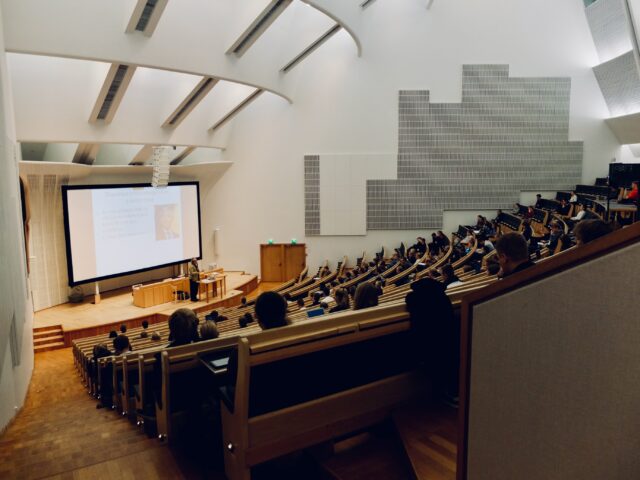First Nations University is working towards becoming academically, legally, and financially autonomous through a partnership with the Mastercard Foundation that includes a $22.3M funding boost. The partnership will also focus on the transformation of Canadian postsecondary education, leadership of economic reconciliation efforts, and development of new Indigenous programs in priority fields. FNU states that becoming autonomous would enable it to demonstrate a new approach to postsecondary education that is accountable to First Nations communities and grounded in their knowledge. “This historic agreement is an example of educational and economic reconciliation and responsibility in action,” said FNU President Jacqueline Ottmann.

Top Ten News
June 18, 2024
McGill University is increasing security near the pro-Palestinian encampment on its campus after a student group published a post on social media inviting people to participate in a “revolutionary youth summer program” on McGill’s campus. According to CBC, the post features an image from 1970 showing armed individuals and a caption pledging to “educate the youth of Montreal and redefine McGill’s ‘elite’ instutional [sic] legacy.” The post has received backlash from several members of the media, politicians, and the community. McGill President Deep Saini said that the post is “extremely alarming” and that he has flagged the social media post as a matter of national security. “It should go without saying that imagery evoking violence is not a tool of peaceful expression or assembly,” said Saini.
The Government of Saskatchewan is investing $8.1M to establish two new health-care training programs at the University of Saskatchewan. The Occupational Therapy Program and Speech Language Pathology Training Program will both award master’s degrees. These two new programs are designed so that students can complete their studies in SK, thereby addressing the shortage of workers in occupational therapy and speech language pathology. Currently SK’s interprovincial agreement programs enable students from SK who would like to study occupational therapy or speech language pathology to study out of province in Alberta. SK also announced an additional $2M for the development of a Physician Assistant program at USask that will begin in Fall 2025.
As residences fill up at the University of Guelph and Cégep de la Gaspésie et des Îles, both institutions are looking into alternative housing options for their incoming students. UoGuelph is reportedly looking at options such as increasing on-campus residence spaces and partnering with the community for off-campus housing after facing criticism from Guelph’s mayor for its housing waitlist. Meanwhile, Cégep GIM has announced that its student residences are full and that it has a waitlist in place for housing. The cégep has compiled a list of accommodations in the regions that it serves, partnered with a private provider to offer housing in the Gaspé region, and begun to develop its supply of student housing.
Dalhousie University recently stated that it will grant academic amnesty to students participating in the pro-Palestinian encampment on its campus. The university’s senate approved a vote that allows students to miss one class or assessment per course until August in order to participate in activities related to the encampment. CBC reports that the students are required to give 24-hour’s notice to their professors in order miss the assessment or class and that students cannot apply this exemption to final exams. The organizers of the campus encampment–a coalition of students from Dal, NSCAD University, Saint Mary’s University, and the University of King’s College–have stated that they plan to stay on campus until their divestment demands are met.
Tomasz Głowacki (WSB Merito University Poznań) outlines how research managers can actively help their team members’ career development. Głowacki describes how managers can help researchers to map their future career and consider the kinds of work they would like to do in the future. The author encourages researchers to be open about their strengths and weaknesses, consider what direction they hope their career will develop in, and seek input from others to gain an understanding of differing perspectives. Głowacki recommends that researchers discuss other roles of interest and the associated requirements with their supervisors, reflect on and identify any missing or weak skillsets, and consider what professional development they will need to undertake to build their skills.
St Mark’s College at the University of British Columbia has launched a Continuing Education Certificate in Theology. This five-course program is tailored for lay ministers, leaders, and other students who are wishing to enrich their faith and ministry. The program’s required courses include Foundations of Theology and Introduction to Scripture, where participants can delve more deeply into theological studies. The program is designed with flexible study options in mind, with courses offered online via Zoom and in-person during the college’s Summer Institute.
Both the University of Niagara Falls Canada and the Université du Québec à Trois-Rivières have taken steps to strengthen their international partnerships. UNFC recently signed a Memorandum of Understanding (MOU) with the Canadian University Dubai in UAE, agreeing to explore areas for academic cooperation and to develop short-term training programs. The university also signed an MOU with Tra Vinh University in Vietnam to develop progression pathway programs and with Universidad EIA in Colombia to explore joint education initiatives and visiting student programs. Meanwhile, UQTR finalized a framework agreement with Mission universitaire de Tunisie en Amérique du Nord that will see them collaborate on strategies for education and research.
Emily Sohn for Nature discusses several ways to deal with the common issue of writer’s block in the sciences. “Some people choose to do science because they […] want to try new things,” explains computer scientist César Soto Valero. “Then, after they realize that the research is mostly about writing research papers, they struggle a lot because they find out that writing a research paper is very hard.” Sohn highlights the tips that scientists have used to overcome their struggles to put ink to paper, such as creating a writing plan before starting a project, writing the contents of a project out of order, and managing expectations around the writing process.
The Université de Moncton has inaugurated a new astronomy observatory. The observatory—which is in the Irène-Léger pavilion on the UMoncton Shippigan campus—will offer the university community and the population of north-eastern New Brunswick engaging activities and learning experiences in astronomy. In a release, UMoncton Shippigan campus vice-recteur Sid Ahmed Selouani also discussed how the university’s recently established partnership with the Club d’astronomie Arthur-William-Landry provide exciting prospects for the campus and community.
